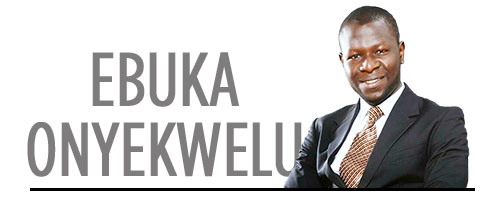” …limitations of Nigerian voters is the third critical obstruction to a robust legislature in Nigeria. ” —Ebuka Onyekwelu
The legislature as an arm of the government, is a critical democratic institution which as a result, has unlimited tenure of office for members. For the executive arm, there is a stipulated tenure of office; maximum of two terms of eight years. But for the legislature, from the State House of Assembly to the National Assembly, lawmakers have unlimited tenure of office. Put differently, as long as they keep getting elected, they will continue to represent their constituency in the legislature. But in reality, Nigeria’s legislature at any level has not been able to retain most experienced lawmakers whose know-how serve as the building blocks for sustainable laws and a robust legislature.

Recently, a former Speaker of the House of Representatives, Rt. Hon. Dimeji Bankole, lamented during a lecture at the National Institute of Legislative and Democratic Studies, that the National Assembly has not been fortunate to tap from the experience of most of its ranking members because each election year, most returned lawmakers are first-timers. According to Bankole, in the sixth Senate, out of 109 senators, about 86 were first-timers. In 2015, according to the former speaker, more than 70 senators were not returned and more than 250 House of Representatives members were also not returned. In 2023, the case is very much the same.
In the State Houses of Assembly, the situation is apparently more problematic. Worst still, often, state lawmakers hardly make it in their transition bid from State Assembly to National Assembly. For instance, in Anambra State, only the Deputy Speaker, Rt. Hon. Pascal Agbodike, successfully transited from House of Assembly to House of Representatives, out of about six members that were candidates of APC, PDP and APGA in their various federal constituencies during the February 25th General Election. Similarly, out of 30 members of the Assembly, only 8 members were able to return for another tenure of office in Anambra State House of Assembly. The Speaker, RT. Hon. Uche Okafor, could not return over zoning in his constituency. This situation is not different from what we have across Southeast states and beyond.
To put into perspective what Nigerians and the legislature as an institution looses when most of its members fail to return or fail to transit to other legislative arm; one has to appreciate the enormity of resources expended training lawmakers locally and internationally. Lawmakers within every legislative year attend various trainings within Nigeria, Africa, Europe and America, funded by the government. A few of the opportunity cost of retiring these lawmakers prematurely are as follows; the resources spent exposing lawmakers to best practices around the world, the depths of knowledge of laws and legislative processes acquired in consequence, and how conversant these lawmakers have become with our system in terms of skill, knowledge and capacity to proffer solutions to problems. The state spend so much to build capacities of Nigerian lawmakers only for the same lawmakers to not be able to serve the country or their states, with the knowledge, experience, exposure and skill set they have acquired through trainings funded by the government.
So, out of 109 senators, only about 30 senators were returned.
The just concluded election has followed the same trajectory in which many experienced lawmakers have been retired by politics. In the whole of Southeast, only Abia State was able to return two experienced Senators; Sen. Orji Uzor Kalu of the APC and Sen. Enyinnaya Abaribe of APGA. In Anambra State, only Sen. Ifeanyi Ubah of YPP returned, although Sen. Victor Umeh had a brief stay in the 8th Senate. In Enugu state, all three senators-elect are first-timers. In Imo state, only one senator was returned and finally in Ebonyi state, all three senators are first-time senators. This is similar to what obtained nationwide in the 2023 election. So, out of 109 senators, only about 30 senators were returned. In House of representatives, most experienced members were unable to return, which prompted the House of Representatives Speaker, Rt. Hon. Femi Gbajabiamela to lament that most of their experienced colleagues are not “lucky” to return, not necessarily because of what they did or didn’t do, the Speaker lamented. Out of 360 members of House of Representatives, more than 255 members could not return.
Interestingly, legislative politics in Nigeria is different from that of executive. In many places, zoning or rotation is cast on a stone and as decisive as day and night. In 2019, ‘common sense advocate,’ Sen. Ben Bruce, could not seek for re-election because of zoning arrangement in his Bayelsa East senatorial district. In the State Assembly, zoning and rotation is far stronger and energized. In Nnewi North local government of Anambra State, since 1999, no House member from that town has gone for second term and none has ever transited from House of Assembly to other legislature, say House of Representatives or Senate. In many state constituencies, and even federal constituencies, ‘it’s our turn’ syndrome has denied states and the country at large, quality contributions that would enrich our laws, from exceptionally bright lawmakers who are limited by zoning arrangement in their constituencies. Aside zoning or rotation, and dynamics of party politics, limitations of Nigerian voters is the third critical obstruction to a robust legislature in Nigeria.
Nigerian government would need to decisively consider how to deal with this disturbing trend. The government might consider making an arrangement wherein bright lawmakers who have been outplayed by political expediencies, have opportunity to volunteer in some kind of public service to the legislature or relevant democratic institute, university, legal or social research institute, so that the system would still profit from their experiences and be enriched by their invaluable knowledge and skill set.

